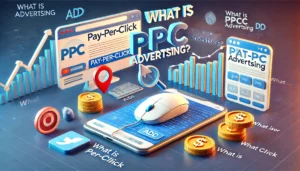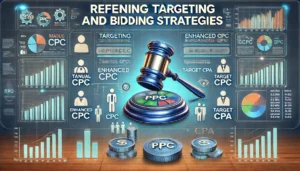How is PPC Tracked?: Essential Metrics and Tools for Optimizing Your Ad Campaigns

How is PPC Tracked? In the ever-evolving landscape of digital marketing, mastering Pay-Per-Click (PPC) tracking is essential for optimizing ad campaigns and achieving business goals. By understanding and leveraging key metrics and tools, marketers can refine their strategies, enhance ad performance, and maximize return on ad spend (ROAS). This article delves into the fundamentals of PPC tracking, explores essential and advanced metrics, and highlights the tools and strategies necessary for effective campaign optimization.
How is PPC Tracked?: Key Takeaways
- Understanding PPC tracking is crucial for optimizing ad performance and maximizing ROI.
- Key metrics such as impressions, clicks, CTR, conversions, and conversion rate provide insights into campaign effectiveness.
- Advanced metrics like CPC, CPA, Quality Score, and ROAS offer deeper analysis for refining strategies.
- Tools like Google Ads, Google Analytics, and third-party solutions are essential for comprehensive PPC tracking.
- Continuous monitoring, adjustment, and safeguarding against ad fraud are vital for maintaining successful PPC campaigns.
How is PPC Tracked?: Understanding the Fundamentals of
What is PPC Advertising?
Pay-per-click (PPC) advertising is a model where advertisers pay a fee each time their ad is clicked. Essentially, it’s a way of buying visits to your site, rather than attempting to “earn” those visits organically. PPC ads can appear on search engines, social media platforms, and various websites. Understanding the mechanics of PPC is crucial for leveraging its full potential.
The Importance of PPC Tracking
Conversion tracking is essential in PPC advertising to gauge the ROI of campaigns accurately. Without it, advertisers struggle to identify high-performing ads and make data-driven decisions. By tracking conversions, advertisers can optimize campaigns for specific outcomes and tweak elements like ad copy, targeting parameters, and landing pages to drive more valuable actions.
How PPC Tracking Works
PPC tracking involves monitoring various metrics to evaluate the performance of your campaigns. This includes tracking clicks, impressions, and conversions. Utilizing advanced tracking tools and analytics available on PPC platforms provides a detailed understanding of campaign performance. Successfully running a PPC campaign involves not just setting up ads but also continuously monitoring and adjusting based on performance metrics.
Continuous tracking of PPC metrics is crucial for optimizing campaigns and ensuring that your advertising spend yields the best possible results.
How is PPC Tracked?: Key Metrics for Evaluating Campaigns
Impressions and Clicks
Impressions and clicks are the foundational metrics of any PPC campaign. Impressions indicate how often your ad is shown, while clicks measure the number of times users interact with your ad. High impressions with low clicks may signal a need to improve ad relevance or creative. Monitoring these metrics helps you understand your ad’s reach and initial engagement levels.
Click-Through Rate (CTR)
Click-Through Rate (CTR) is a critical metric that shows the percentage of impressions that result in clicks. A higher CTR often indicates that your ad is resonating well with your audience. To calculate CTR, use the formula:
CTR = (Clicks / Impressions) * 100
A low CTR might suggest that your ad copy or targeting needs refinement. Consistently tracking CTR helps in making data-driven adjustments to improve ad performance.
Conversions and Conversion Rate
Conversions are the ultimate goal of any PPC campaign, representing the actions you want users to take, such as making a purchase or filling out a form. Conversion Rate is the percentage of clicks that result in conversions. To calculate Conversion Rate, use the formula:
Conversion Rate = (Conversions / Clicks) * 100
A high Conversion Rate indicates that your landing page and overall user experience are effective. Optimizing for conversions is crucial for maximizing the return on your ad spend.
Understanding these key metrics is essential for evaluating the effectiveness of your PPC campaigns. By continuously monitoring and optimizing these metrics, you can ensure that your advertising efforts are aligned with your business objectives.
Advanced PPC Metrics for In-Depth Analysis
Cost per Click (CPC) and Cost per Acquisition (CPA)
Understanding the cost dynamics of your PPC campaigns is crucial. Cost per Click (CPC) measures the amount you pay for each click on your ad, while Cost per Acquisition (CPA) calculates the cost to acquire a customer. Monitoring these metrics helps you gauge the financial efficiency of your campaigns. Lowering your CPC can lead to more clicks within the same budget, whereas optimizing your CPA ensures that your ad spend translates into actual conversions.
Quality Score and Ad Relevance
Quality Score is a critical metric provided by platforms like Google Ads. It evaluates the relevance and quality of your keywords and ads. A higher Quality Score can lead to lower CPCs and better ad placements. Focus on improving your ad relevance by aligning your ad copy with the keywords and landing page content. This not only enhances user experience but also boosts your Quality Score, making your campaigns more cost-effective.
Return on Ad Spend (ROAS)
Return on Ad Spend (ROAS) is a vital metric that measures the revenue generated for every dollar spent on advertising. A higher ROAS indicates a more profitable campaign. To calculate ROAS, divide the revenue by the ad spend. For instance, if you earned $500 from a campaign that cost $100, your ROAS would be 5.0. Regularly analyzing your ROAS helps you identify which campaigns are delivering the best return and allows you to allocate your budget more effectively.
Advanced PPC metrics like CPC, CPA, Quality Score, and ROAS provide a comprehensive understanding of your campaign’s performance. By focusing on these metrics, you can optimize your ad spend and achieve better results.
Tools for Effective PPC Tracking
Google Ads and Google Analytics
Google Ads and Google Analytics are indispensable tools for any PPC campaign. Google Ads agencies often rely on these platforms to provide real-time data on impressions, clicks, and conversions. By integrating Google Analytics with Google Ads, you can gain deeper insights into user behaviour and track the entire customer journey from ad click to conversion. This integration allows for more precise targeting and optimization, ensuring that your ad spend is used effectively.
Microsoft Advertising
Microsoft Advertising offers robust tracking capabilities similar to Google Ads. It provides detailed metrics on keyword performance, device performance, and geographic performance. This platform is particularly useful for reaching a different audience segment, as it covers Bing and other Microsoft-owned properties. Utilizing Microsoft Advertising can diversify your PPC strategy and help you tap into new markets.
Third-Party PPC Tracking Tools
There are numerous third-party tools available that can enhance your PPC tracking efforts. These tools often offer advanced features such as multi-channel tracking, automated reporting, and AI-driven insights. Some popular options include SEMrush, SpyFu, and Improvado. These tools can provide a more comprehensive view of your PPC performance, allowing for more informed decision-making.
For a thorough Google Ads audit, consider using third-party tools to identify areas for improvement and ensure your campaigns are running optimally.
By leveraging these tools, you can gain a competitive edge and make data-driven decisions to optimize your PPC campaigns effectively.
Strategies for Optimizing PPC Campaigns
Refining Targeting and Bidding Strategies
To maximize the effectiveness of your PPC campaigns, it’s crucial to continuously refine your targeting and bidding strategies. Start by analyzing your audience data to identify high-performing segments. Use this information to adjust your targeting parameters, ensuring your ads reach the most relevant users. Additionally, experiment with different bidding strategies, such as manual CPC, enhanced CPC, and target CPA, to find the optimal approach for your campaign goals.
Improving Ad Creatives
Your ad creatives play a significant role in capturing the attention of potential customers. Focus on crafting compelling headlines, persuasive ad copy, and eye-catching visuals. A/B testing different ad variations can help you determine which elements resonate best with your audience. Remember, high-quality ad creatives can significantly boost your click-through rates and conversion rates.
Continuous Monitoring and Adjustment
Optimization is not a one-time activity but an ongoing process. Regularly monitor your campaign performance using tools like Google Ads PPC and Google Analytics. Look for trends and patterns in your data to identify areas for improvement. Make data-driven adjustments to your campaigns, such as pausing underperforming keywords, reallocating the budget to high-performing ads, and refining your targeting criteria.
All these strategies offer unique ways to enhance your campaigns’ effectiveness. Keep in mind that optimization is not a one-time activity but rather an ongoing process that calls for regular checks and adjustments based on campaign performance.
By implementing these strategies, you can ensure that your PPC campaigns are continuously optimized for better performance and higher returns on investment. Whether you’re managing your campaigns in-house or working with a PPC ad agency, these tactics will help you achieve your advertising goals.
Safeguarding Your PPC Investments
Identifying and Preventing Ad Fraud
Ad fraud is a significant threat to your PPC campaigns. Fraudulent clicks can drain your budget without delivering any real value. Using anti-fraud tools like Spider AF can help you detect and prevent fraudulent activities, ensuring that your ad spend is used effectively. Regular PPC audits are essential to identify any discrepancies and maintain the integrity of your data.
Ensuring Data Integrity
Maintaining accurate and reliable data is crucial for making informed decisions. Implementing robust tracking mechanisms and regularly auditing your campaigns can help ensure data integrity. A London PPC agency can assist in setting up these systems and provide ongoing support to keep your data clean and actionable.
Using Anti-Fraud Tools
Anti-fraud tools are indispensable for protecting your PPC investments. These tools can identify suspicious activities and block fraudulent clicks in real-time. Partnering with a reputable PPC agency or a specialized PPC eCommerce agency can provide you with access to advanced anti-fraud solutions and expert guidance on optimizing your campaigns.
Conclusion
Mastering PPC tracking is essential for any marketer looking to optimize their ad campaigns and achieve the best possible return on ad spend. By understanding and utilizing key metrics such as impressions, clicks, CTR, CPC, CPA, and conversion rates, you can gain valuable insights into your campaign’s performance and make data-driven decisions. Leveraging advanced tools like Google Ads, Google Analytics, and other PPC platforms will provide you with the detailed reports and analytics needed to refine your strategies. Remember, continuous monitoring and adjustment based on these metrics are crucial for success. Embrace these practices, and you’ll be well on your way to becoming a PPC expert, driving better results and maximizing your advertising investments.
Frequently Asked Questions
What is PPC advertising?
PPC (Pay-Per-Click) advertising is a model of online marketing where advertisers pay a fee each time their ad is clicked. It’s a way of buying visits to your site, rather than attempting to earn those visits organically.
Why is PPC tracking important?
PPC tracking is essential for optimizing campaigns and ensuring a good return on ad spend (ROAS). It helps in understanding the performance of your ads, identifying strengths and weaknesses, and making data-driven decisions.
How does PPC tracking work?
PPC tracking works by using tracking codes and cookies to monitor user interactions with your ads. Metrics such as impressions, clicks, and conversions are tracked to evaluate the effectiveness of the ad campaigns.
What are the key metrics tracked in PPC campaigns?
Key metrics include Impressions (number of times your ad appeared), Clicks (number of times users clicked on your ad), Click-Through Rate (CTR), Conversions, Conversion Rate, Cost per Click (CPC), and Cost per Acquisition (CPA).
Which tools are commonly used for PPC tracking?
Common tools for PPC tracking include Google Ads, Google Analytics, Microsoft Advertising, and various third-party PPC tracking tools. These tools provide detailed reports and insights on your PPC ad performance.
How can I prevent ad fraud in my PPC campaigns?
To prevent ad fraud, you can use anti-fraud tools, monitor your campaigns for unusual activity, and ensure data integrity by regularly auditing your traffic sources. Identifying and preventing ad fraud is crucial for safeguarding your PPC investments.
Author
Search Blog
Free PPC Audit
Subscribe to our Newsletter
The Voices of Our Success: Your Words, Our Pride
Don't just take our word for it. With over 100+ five-star reviews, we let our work-and our satisfied clients-speak for us.
"We have been working with PPC Geeks for around 6 months and have found Mark and the team to be very impressive. Having worked with a few companies in this and similar sectors, I rate PPC Geeks as the strongest I have come across. They have taken time to understand our business, our market and competitors and supported us to devise a strategy to generate business. I value the expertise Mark and his team provide and trust them to make the best recommendations for the long-term."
~ Just Go, Alasdair Anderson



